Are Theatre Artists Hardwired?
Most of us who make theatre have found ourselves, at one point or another, in a conversation about why we do what we do. No matter the reason for one’s passion for theatre, a sentiment that is common among theatre artists is that theatre is what they were born to do. Believe it or not, there’s now data to back this up. Researchers at Johnson O’Connor Research Foundation began studying theatre artists in 2011 in an attempt to understand how this group differs from the average population in terms of aptitude.
Johnson O’Connor Research Foundation, named for its founder, is a Boston-based nonprofit that studies differences in human abilities. Generally speaking, an individual is considered to possess an aptitude if they show ability that meets or exceeds the 70th percentile in their age-norm group. Among Johnson O’Connor’s twenty-two standard aptitude tests, results show long-term relative stability, meaning a person who has a particular aptitude at age fifteen will still have that same aptitude at age fifty-five regardless of his or her education, experience, or acquired skill. The suggestion is that talent—or at least talent of certain types—is natural rather than created.
Where a skill is something that is developed over time, built up by practice and refined in the foundries of repetition, an aptitude is something present in our mental framework, something inextricable from our natural selves that allows us to complete a task or learn something more quickly and easily than our peers can. O’Connor discovered through his research that professionals who possess aptitude for their chosen field are markedly more satisfied in their work.
One way in which the Foundation broadens its research is to conduct career validation studies, in which a group of professionals in a specific field or job are tested to see if there are similarities in how they score on aptitude tests. This is where theatre artists come in.
For theatre professionals, the aptitude for seeing possibilities is a defining characteristic.
The Theatre Artist Study
I myself am a playwright. I had my first play produced professionally in 2003, and moved to Chicago to get my MFA and pursue a career in theatre. Like many artists, I’ve had to supplement my creative work with a stable job. I discovered Johnson O’Connor’s Chicago lab through a friend and found the company’s history and mission to be fascinating. The tests are standardized, so to give and interpret them one must simply learn how to give and interpret them. Once I completed my training, it didn’t take long for me to become curious about how my fellow theatre people might score on O’Connor’s tests. The Foundation had never researched theatre artists before, so my pitch for a new study was met with enthusiasm.
From 2011 to 2014, the Foundation collected data from theatre professionals—primarily Chicago-based artists—by having them complete an online survey about career goals and preferences, followed by the aptitude tests. Over one hundred and thirty participants ended up taking the full test battery. To qualify as a “professional,” for our purposes, a theatre artist was expected to be currently active in the field, as well as meet at least one other criterion, such as a degree in theatre arts or affiliation with a trade association/union. Acknowledging that many theatre artists wear multiple hats in the industry, a participating artist also had to self-identify his or her primary role in theatre. This was a forced choice and, for many, the most agonizing part of the testing. These categories were necessary so that we could not only see how theatre artists differ from the average person in a broader sense, but then also study how they differ from each other. Ultimately, we ended up with six groups: actors, directors, playwrights, designers, technicians (including stage managers, production managers, and technical directors), and then a sixth group which included all theatre professionals together in one sample.
Theatre and Divergent Thinking
One category of aptitudes that stands out for all theatre artists, regardless of primary role, were the abilities classified as divergent thinking. Briefly, divergent thinking refers to thought processes by which a person generates new ideas or considers many possible outcomes (as opposed to convergent thinking which follows logic and rules to arrive at a specific or correct solution). The Foundation administers two measures of divergent thinking, one called Ideaphoria (literally: flow of ideas) and another called Foresight.
Let’s start with Foresight, as it is the singular aptitude shared by all groups of theatre professionals we studied. Foresight is a name given to the talent for “seeing possibilities.” Those with an aptitude for Foresight may traditionally find outlets for it in entrepreneurial ventures, research and development, nonprofit work, and other areas that encourage a future-oriented approach to big picture questions and problems. High Foresight scorers are often viewed as dreamers, though they may think of themselves as visionaries, those people who are primarily concerned not with what’s happening today, but with what possibilities might exist or emerge down the road. Foresight is about creativity in concept.
Playwrights use Foresight in imagining characters, plot points, and themes. Directors use Foresight while exploring production and staging concepts in order to realize the world of the play, or in re-envisioning a classic text. Designers use Foresight in everything they do; theatre designers, like visual artists, have to take raw materials and imbue them with storytelling and expression. Actors use Foresight in testing various readings of a character, scene, or line, and in imagining backstory and situations outside the play that may inform their characters’ choices. And perhaps most interestingly are those in stage and production management, who also scored high in Foresight but for whom the ability likely factors in as less a creative ability per se, and more an ability to see a theatrical project as a long-term series of phases, problems, and competing deadlines.
The Foresight result was the most eye-popping, as theatre artists showed a mean score in the 74th percentile. In fact, over the Foundation’s 90-plus-year history, the theatre artist study is the first in which a specific career group tended to have Foresight over any other aptitude. For theatre professionals, the aptitude for seeing possibilities is a defining characteristic.
Foresight tends to influence people in other ways, as well. High Foresight scorers are more likely to be motivated by long-term challenging goals; in some cases that may be a more nebulous goal with no distinct end date (like, for example, mastering one’s artistic craft). High Foresight scorers also tend toward a dogged persistence in their endeavors; once they have a goal in mind it can be difficult to knock them off that path. Sound familiar?
As mentioned, the other divergent thinking aptitude measured by Johnson O’Connor is called Ideaphoria, the aptitude for idea flow. Ideaphoria is useful for generating content and maintaining a fluency in communication; it’s commonly seen among journalists, schoolteachers, salespeople, and professionals in typical “creative” fields like marketing and public relations. All groups of theatre artists registered above average scores in Ideaphoria, but the statistical spike was most notable among directors and playwrights. While not as prominent in the sample as Foresight, Ideaphoria makes sense as an ability shared by directors and playwrights, as they are the artists most frequently in the position to have to communicate, or even sell, their ideas.
Theatre artists overwhelmingly favored ‘Collaborating with other artists’ and ‘Sustained group contact and collective creativity’ over ‘Developing artistic expertise’ and ‘Achievements toward actualizing my aesthetic point of view.’
The theatre artist sample did not show significant scoring trends in numerical aptitude, clerical ability, inductive reasoning, or fine motor dexterity. There were, however, significant trends in:
Analytical Reasoning
Theatre artists as a group scored significantly above the Foundation mean in a type of convergent thinking called Analytical Reasoning, which is the ability to arrange ideas and concepts into a logical sequence or system. Often seen among editors, computer programmers, and urban planners, Analytical Reasoning was found to be highest among the playwrights we tested. Carlos Murillo, a playwright and the head of playwriting for The Theatre School at DePaul University, had this to say about his high score: “In a sense, at least in the way I work and teach, convergent thinking can't really happen without divergent thinking,” he says. “When you make an ideaphoric mess it requires analytical [reasoning] to make heads or tails of it and shape it into something that has coherence.”
Spatial Thinking
The aptitude for Structural Visualization (the ability to visualize objects and structures in three-dimensional space and rotate them mentally) is an aptitude we commonly associate with most types of engineering, physical sciences, and architecture. In this area, theatre designers as well as technicians scored high. Spatial aptitude seems like a more obvious fit for technical directors as well as scenic, costume, and lighting design, but sound designers in the group also fit the trend. In music, structural visualization tends to be higher among composers than among performing musicians; perhaps sound designers use the ability in building cues, planning how sound interacts with the action of the play, and in composing original music.
Visual Aptitudes
Designers and technicians scored similarly to each other in another way: they both scored high in Memory for Design (the ability to retain and recall two-dimensional images and patterns) and Observation (the ability to recognize small visual details and remember their positions). These abilities are generally useful in artistic and design fields, but also have applications in certain scientific and medical roles. Considering the amount of diagrams, plots, and plans that any designer or technician has to keep track of, these aptitudes surely make the job easier. (It will delight stage managers to know that among all of the groups, Observation was lowest among directors.) Additionally, designers were found to score high in a third visual aptitude: Color Discrimination, the ability to recognize very fine differences in color.
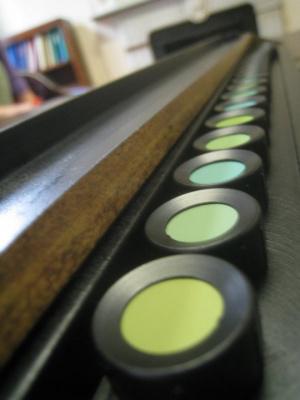
in which the examinee is asked to arrange eighty-five
color hues with very subtle differences.
Auditory Aptitudes
The Foundation measures three auditory abilities that are generally considered to be “music aptitudes,” and the theatre artists tended toward higher auditory scores across the board; however, actors scored higher than the other groups on the tests of Tonal Memory (tonal sequences and melody) as well as Rhythm Memory (timing patterns and cadence). Tonal Memory would find some clear uses in musical theatre or other plays with songs, while Rhythm Memory can also aid a performer in dance, movement and fight choreography, and comedic timing. Additionally, auditory aptitudes may help actors during the process of memorization or in picking up a new dialect.
Personality and Work Approach
In the Johnson O’Connor test battery there is one solitary personality test, which takes the form of a Word Association exercise. An examinee is prompted with a series of words, and is asked to respond with the first word that comes to mind. Responses on this test help to categorize examinees into two broad groups: those with an “Objective” work approach, and those with a “Subjective” work approach. Those with an Objective approach tend to favor generalist roles in which they find success working through others (e.g., managers, executives), whereas those with a Subjective approach tend to prefer operating as a specialist and finding success through individual effort (e.g., surgeons, artists). Group contact and variety tend to be extremely important to Objective personalities; expertise and autonomy tend to be the desires of the Subjective scorers. Most people who are tested by the Foundation fall into one of these two broad categories, although there is a segment of the population that scores “Intermediate,” or right on the border. Intermediate scorers may find aspects of both approaches to be relatable and not need to strongly honor one over the other.
In all fields, the Foundation expects to see some professionals who score Objective, and some who score Subjective. How one scores can influence what type of role or function they might find fulfilling. One of the main curiosities going into the theatre artist study was the question of how they would score on this test—theatre is, after all, an intensely collaborative art form. On our online survey, theatre artists overwhelmingly favored “Collaborating with other artists” and “Sustained group contact and collective creativity” over “Developing artistic expertise” and “Achievements toward actualizing my aesthetic point of view,” respectively.
Accepting that, we anticipated more Objective scores from the theatre artists, in particular among groups like directors and stage managers, who must always find success by coordinating the efforts of other people. In fact, directors did trend toward somewhat more Objective scores, but not to the extent anticipated. Theatre artists in general scored much more Subjective than expected.
Dorothy Milne, Artistic Director of Chicago’s Lifeline Theatre, has some insight: “My own aptitudes are sharply demarcated between what comes effortlessly to me and what is near impossible,” she remarked, citing a common experience with aptitude testing. “It affirms the idea that none of us can go it alone; teamwork is essential,” Milne said. “I bring my area of expertise to every theatrical enterprise—but I also count on mining each team member's areas of specialty.” When considering the production of a play, each artist has a unique role to fill. So while collaboration is vital to the successful creation of a piece of theatre, perhaps it is a specific type of collaboration—not group-work as we often think of it, but rather the sum total of like-minded experts.
Objective theatre artists were less likely than Subjective scorers to report that they were currently satisfied by their theatre careers. That could suggest that theatre as an industry does not provide as many fulfilling opportunities for generalists. Or it could be that Objective theatre artists need to be very careful about what kinds of projects they seek out; for example, it would stand to reason that Objective artists may find devised, large ensemble, or community-centric work to be more gratifying than other modes of playmaking.
Artists who gravitate toward certain specialties are often driven by more than just creative ambition and personal interest. In many cases, they may be following a path that’s more biological than it is deliberate.
Conclusions
So what does all of this mean? For one thing, it tells us that artists who gravitate toward certain specialties are often driven by more than just creative ambition and personal interest. In many cases, they may be following a path that’s more biological than it is deliberate. This is not to say that we are predestined to be one kind of artist and only that.
Take my aptitude pattern, for example: I score much more like a designer than I do like a playwright. Does this influence how I write plays? Without a doubt. When I write, I have a strong sense of how the play will look in motion; I like to invite bold design choices, often including physical hindrances and complicated mechanics in my plays, but I always have an idea of how these elements might be realistically achieved. I also like to layer and weave dialogue in a quasi-spatial way, almost like composing a song. Since I’m wired to think more visually and spatially, that seeks outlets in my approach to writing, and my awareness of this is extremely beneficial. I don’t have the Ideaphoria aptitude like many other playwrights, so the pages aren’t just going to flow out of me like water from a open hydrant; I don’t have an aptitude for Analytical Reasoning either, so it behooves me to be open to structural feedback from directors and dramaturges.
In theatre, our roles are often fluid and we have room to explore and discover as well as magnificently fail. Especially in university drama programs across the country, young artists have opportunities to challenge their perceptions of themselves and their abilities as they search for their theatrical niche. Murillo remarked that what he learned from his test results has helped him in his thinking, not only about his own writing, but also about how he structures his playwriting courses. “I have incorporated [Ideaphoria and Foresight] into my teaching vocabulary,” he said, “[I encourage my students] to say yes to all ideas good and bad, let free associations flow, embrace the multiple possible directions any given idea might lead you.”
The mission of Johnson O’Connor is to unlock human potential. It’s a lofty mission that is, in various ways, shared by many practitioners of the theatre. What does it mean to be human? How can we better understand ourselves? Our partners? Our fellow citizens? Why do we behave the way we do? What are the difficulties we face? There are myriad factors at play that make up who we are as people, as artists, and as a community. This study provides empirical evidence that while we are all individuals, there is a certain sameness among those of us who make theatre, common curious energies that seek to find expression in this most limitless of art forms. What do we do with those energies—indeed, those gifts?
We see possibilities. We make worlds.

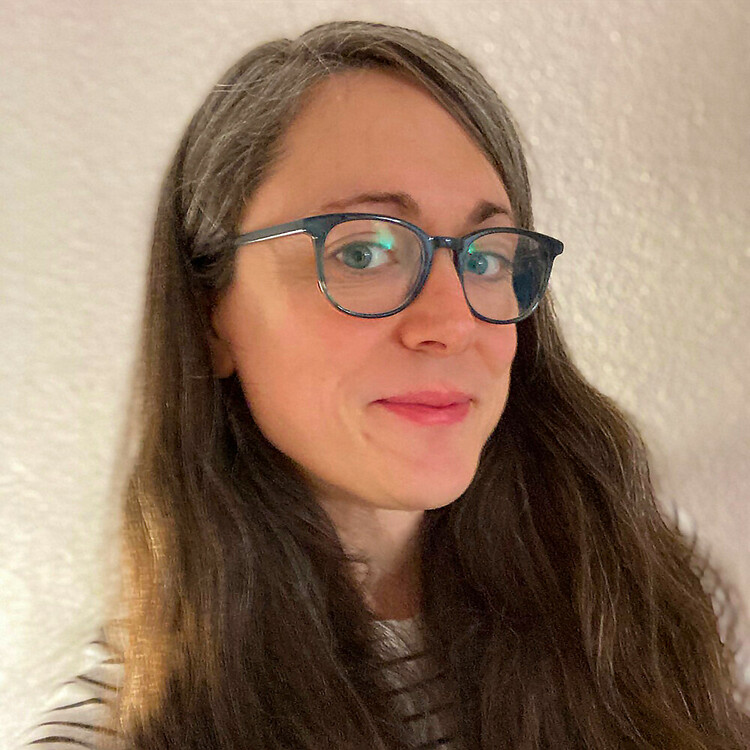
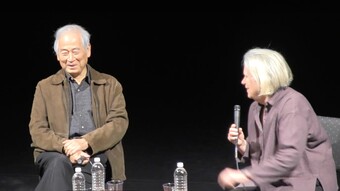


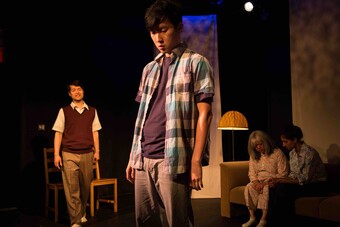

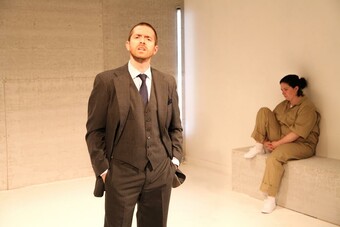

Comments
The article is just the start of the conversation—we want to know what you think about this subject, too! HowlRound is a space for knowledge-sharing, and we welcome spirited, thoughtful, and on-topic dialogue. Find our full comments policy here
Would love to see this compared to artists from other fields. (Especially film!)
These thought processes and skills though traditionally applied in creative careers are highly in demand in other industries. I urge all artists to explore innovative ways of applying their unique skill set beyond the parameters of their art alone (not in place of, rather in tandem). It can offer surprisingly fulfilling outcomes - personally, professionally and financially.
Why this study makes sense springs from the works of many philosophers for centuries. The idea of people being hardwired with certain preferences for taking in information and then making decisions based on that information was brought to the recent public by Carl Jung with his study of psychological types. But goes back to Plato and his "Artisan", "Guardian" "Idealist" and "Rational". Your preferences are hard wired or hardware but your environment, friends, family is like the software. Isabel Myers took Jung's teachings and expanded on them. She wrote a wonderful book called "Gifts Differing". "We are all of one body but with gifts differing." Jung felt that while you are young, say up to 30 years, you should concentrate on your strengths, your preferences. Then to be healthy or mature, you begin to examine other people's preferences that are different than yours. I have often thought this is especially useful for playwrights and screen writers in order to not make the common youthful mistake of having every character be a version of yourself.
"Foresight" is what Jung and Myers called being "intuitive" versus a "sensor". Intuitives see things in patterns, not detail first. They can train themselves to take in detail, but it is not their preference. Yes, they are often futurists, inventors, engineers, stand up comedians.... A sensor sees in detail when he looks at something. They are very handy in management to keep things from becoming pie in the sky.
I've been everything in my long career from actor, to director, costume designer and finally talent agent. My advice is to not take anybody's advice ....unless it really rings true.
Is this study published or written up anywhere so that one might read the entire study? Thanks.
You should contact the research department at Johnson O'Connor in Chicago (jocrf.org), they might be able to provide more in depth statistical analysis. I know there's work being done on a report for more of a scientific audience; that step usually takes a little longer.
Linda Houser-Marko was the collaborating researcher on this study. Thanks for your interest!
Fascinating!
Fascinating article, Scott. Every word rings true to me, as deep inside I've always known I wanted to be a
writer (I read a lot growing up, even in grade school). Alas, I suffered a lot because I
couldn't admit it even to myself until my early twenties, and to others for several more years after that, since from an early age the expectation regarding me was that I should go into engineering (which on the surface I seemed to be suited to) and "make good money" and thus save the farm (so to speak) and everyone on it.
I hope your article will help other writers to admit, and defend, their true destiny far sooner than I did.
-------------------------------------------------------------------------------------------------
http://howlround.com/pulp-i...
http://howlround.com/though...
I've always considered my extraordinary access to my unconscious mind as the key factor for considering myself an artist. I'm often lost in a dream world which can be more profound than the real world. Theater has always fascinated me since it presents an imaginary world made flesh, the imagination as a physical presence. I've also studied shamanism, the spiritual practices for exploring the psyche, or spirit world, and shaman rituals are often cited as the most primitive form of theater. So a natural ability to explore the psyche makes rituals and symbolism seem highly significant.
"I've always considered my extraordinary access to my unconscious mind as
the key factor for considering myself an artist. I'm often lost in a
dream world which can be more profound than the real world. Theater has always fascinated me since it presents an imaginary world made flesh, the imagination as a physical presence..."
Yes!!!
"Theater has always fascinated me since it presents an imaginary world made flesh, the imagination as a physical presence." I relate, and for me I think spatial aptitude plays a role: the ability to visualize something that doesn't exist.
This is so cool.
When I've been asked why I write plays instead of fiction for example, I've always answered "Oh my mind just works like that. I think in scenario." I don't think I really believed it literally--it was my quick answer to a constant question. But this makes me rethink! It might be true that I'm wired to write plays.
This is going to provide some light bulb moments for creative professionals in many disciplines. Well done!
What an interesting read!
I have shared this study with my theatre students. It is marvelous to finally have terminology to indicate the thought processes we as theatre professionals have always enjoyed.
Scott,
This is an enlightening study! Simply put: It's great to understand why we as a group feel that undeniable pull to be nothing but theatre practitioners. Thx you for playing your part and for sharing.
That was really fascinating. Thanks for sharing this study!
Totally fascinating and sound about right for me as a playwright/director